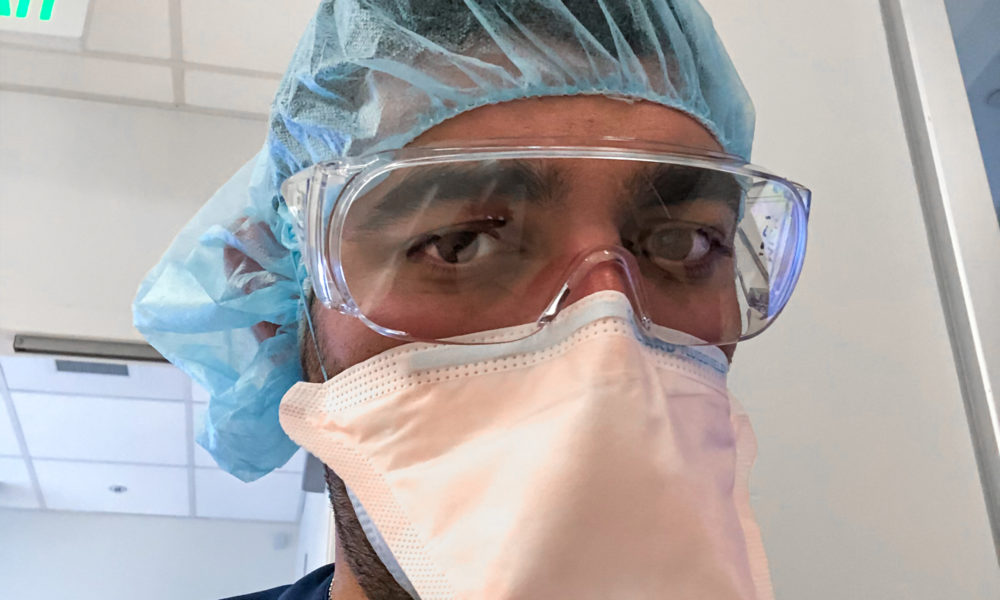Jovani Rioja noticed he had signs of coronavirus around April 5.
“I remember it was like a semi-truck had hit me. I had these body aches all over like my back and legs. I couldn’t really get out of the couch,” Rioja said.
His wife Crystal did not believe it could be coronavirus at first, but the 29-year-old Long Beach State graduate student and registered nurse immediately accepted it as a possibility.
After all, he works in an intensive care unit.
“I do work in an ICU, around a COVID unit. So, it could happen, I mean it’s just a possibility,” Rioja said.
He was unable to comment on the location or name of the hospital where he works.
According to Rioja, his wife had to help him from their living room couch as he stood up to reach for Tylenol.
He said the timing of his diagnosis had shocked him, as he had been working with COVID-19 patients since March, and it had taken nearly a month for him to catch the virus.
After receiving his results, Rioja said he and his wife began cleaning their home. A registered nurse herself, his wife and him said they had the necessary tools and materials like gloves and masks to stay safe.
Rioja researched what to do and what ways to keep him and his wife safe.
“I was doing more reading about quarantine; you know the isolation I can do,” Rioja said. “Luckily since we’re both RN’s, we both had the stuff like the masks at home, the alcohol, the wipes. So, we were actually able to clean our house really well,”
As he went about his isolation, he said his family members continued checking up on him. Most worried about death. Rioja was not worried about dying from the virus.
“They called me every day, texted every day,” Rioja said. “It was just they were worried because all you hear is death in the news— you don’t hear any recovery patients. Because I was fine, I had no on-going conditions, I’m young, I’m active, there [was] no need to worry about that.”
Rioja said he knew it was a high possibility that he would test positive for the virus because of the number of patients he worked with.
“We’re around the patients, we’re constantly in the room, we’re going in and out of the room, we’re reusing our masks for most of the shift,” Rioja said.
Rioja has worked with 10 patients who have tested positive for coronavirus. One of these patients has died.
“It’s dark because we did a lot of work. It was a constant battle trying to beat this thing,” Rioja said. “We tried different things and it just kept coming back stronger. We would try to make a turn for the better and all of a sudden we go right back like ‘Goddammit, I got to figure something else out.’ We did all our best but at times you just can’t.”
As a frontline worker, Rioja said he never expected to deal with something this massive in his career, but the gravity of the virus only made him more dedicated to his medical oath.
“I put my life on the line to take care of these patients. I took an oath. I would do anything I can to protect the community,” Rioja said. “I wanted to do this. I chose this, I have to do it. I got to fight this.”
Rioja had initially wanted to pursue a career in engineering. After experiencing the difficulty of one math class he chose the medical field.
“I always wanted to be a provider, dealing with more patients, treating the patients,” Rioja said.
As frontline workers around the world continue to be praised for their work, Rioja said the praises are not the reasons why he keeps moving forward.
“I appreciate your praise, I appreciate your thank you, I appreciate your gift, but at the same time I’m doing this because I want to be here,” Rioja said.
He fully recovered around day 15 since his initial symptoms. He was able to get up and be active again.
Rioja returned to work on April 29. He is not worried if he tests positive again.
“There’s a possibility but hey, that’s why you go into it,” Rioja said. “I can beat this; I can do this.”




